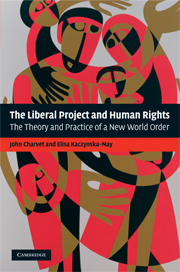Book contents
- Frontmatter
- Contents
- List of abbreviations
- Preface
- Introduction: what is liberalism?
- Part I Liberal beginnings
- 1 The contextual origin of liberal thought and practice
- 2 The Westphalian society of sovereign states
- 3 The growth of liberal universalism
- Part II The UN regime on human rights
- Part III Critique and defence of liberalism
- Notes
- Index
1 - The contextual origin of liberal thought and practice
Published online by Cambridge University Press: 04 June 2010
- Frontmatter
- Contents
- List of abbreviations
- Preface
- Introduction: what is liberalism?
- Part I Liberal beginnings
- 1 The contextual origin of liberal thought and practice
- 2 The Westphalian society of sovereign states
- 3 The growth of liberal universalism
- Part II The UN regime on human rights
- Part III Critique and defence of liberalism
- Notes
- Index
Summary
The relative and universal value of liberalism
What we have so far said about the nature of liberalism suggests that we are committed to a simple liberal universalism: it would be better for human societies to organize themselves through liberal forms at all times and places. But such a claim looks fairly implausible. It is not at all clear that liberalism has much relevance to small-scale and face-to-face societies such as tribal or peasant forms of life. It seems much more sensible to say that liberal ideas and practices arose in a certain context and that they are primarily relevant to and realizable in contexts of the same type. Its original context was the series of events occurring in Europe, in the first place, from the sixteenth century and associated with the rise of the modern sovereign state, the development of market economies and the emergence of devastating and unresolved religious conflict. Liberalism is undoubtedly a European product but it is a product of European developments that have spread throughout the world and hence, even on the contextualist view, have made liberalism relevant, and in our view justifiable, on a universal basis. Every society now enjoys or seeks to acquire the institutions and rights of sovereign statehood and a dynamic economy and is also marked by some degree of ethno-cultural or religious diversity.
- Type
- Chapter
- Information
- The Liberal Project and Human RightsThe Theory and Practice of a New World Order, pp. 19 - 41Publisher: Cambridge University PressPrint publication year: 2008



